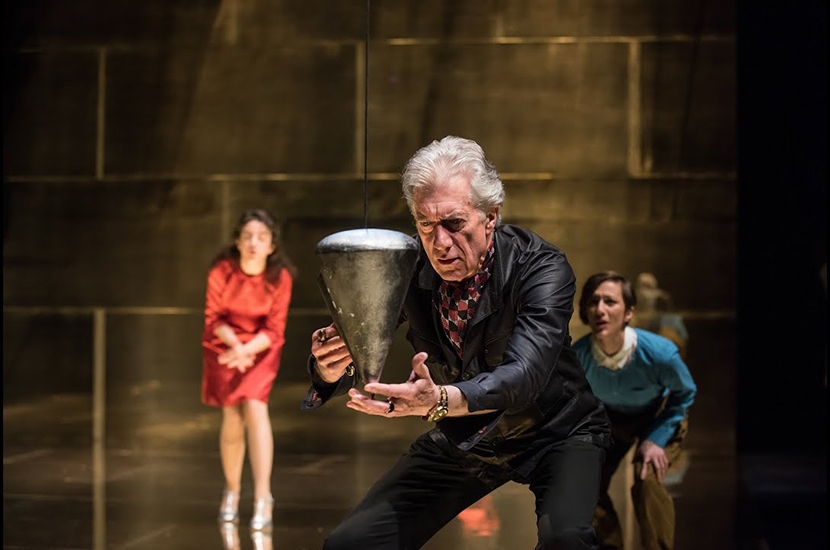The BBC announces Merchant of Venice as if it were a Hollywood blockbuster. ‘In the melting pot of Venice, trade is God.’ The RSC, which staged the show in 2015, calls it ‘a thrilling, contemporary interpretation’.
Each element in Polly Findlay’s production looks fine. Jacob Fortune-Lloyd and Patsy Ferran (Bassanio and Portia) are as cute as a pair of Love Island hotties. But the costumes are hard to decipher and they seem attached to no particular era. Most of the characters wear chic, well-tailored outfits except for Antonio (Jamie Ballard) who sports a T-shirt and seems close to tears most of the time. He and Bassanio are presented as openly gay even though this weakens the character of Portia. She sees her future husband kissing Antonio on the lips in public and yet she never questions him about this conflict of interest. Shylock is even more puzzling. The cast all speak in standard Home Counties English but Makram J. Khoury (Shylock) uses a ‘funny immigrant’ accent and wears a cheap jacket and secondhand trousers. He’s the richest character in the play but he appears to be an asylum-seeker. It’s not clear what these gestures mean.
Rush will no doubt return to the theatre and an invitation will reach me. I have an inkling I’ll decline
The performing area has been coated in mirrored varnish that reflects the action back to the audience. That looks jolly nice but does it convey anything? The rear wall is supplemented with a silver orb, as large as a beach ball, which hangs from an unseen thread and swings to and fro throughout the play. Could that be the earth? Fate? Time? The moon? All four? These gestures seem to have been bunged together at random to attract a paragraph of arcane exegesis from an over-zealous student. Well-placed ornaments should clarify a play, not obscure it.
One performance in particular throws the show off-kilter. Brian Protheroe, who was a cult pop singer in the 1970s, erupts on to the stage in the minor role of Aragon, a potential suitor to Jessica. Protheroe is well over 70 but he moves like a teenage gymnast and he gives his fellow actors a master class in rock-stadium swagger. After his exit, they seem like bemused castaways without him.
Rush is a romantic soap opera by Willi Richards. The show was due to run for a few weeks this spring at the Trafalgar Studio 2, or ‘Traf Two’ as it’s called. This stuffy 100-seat bunker in Whitehall is heartily detested by most reviewers, but theatre-makers like it because the costs are low and its location qualifies it as ‘the West End’. When the virus struck, the producers decided to mount a version of Rush on Zoom. Little effort was invested in the transfer. The stage directions are indicated with typed inserts, as in a silent movie. And the actors read their roles from scripts on their laps, just out of shot.
The action opens with two men meeting at an airport. One is 55, the other about 30. They converse in antiquated Cold War jargon and discuss a wodge of cannabis that they plan to smoke. A code, perhaps? It turns out that the men are long-standing lovers who use role play to spice up their fading relationship. They have other minor fetishes. ‘Next time bring me a pair of your underwear. The old ones are losing their scent,’ says the senior character, known as Man (Rupert Everett). His younger lover, Boy, is a portrait artist who has moved in with his latest conquest, named Lad. Man is intrigued but not threatened by this development. How will the love triangle resolve itself?
Boy, the emotional centre of the piece, wants Man and Lad to meet and to agree that the trio should maintain parallel relationships without jealousy or rancour. Man embraces this proposal because he hates telling lies. ‘It’s bad. Nasty in politics. Nasty in private lives too.’ But Lad is a needy youngster with little experience of love and he refuses to share Boy with a rival. Eventually they find a resolution to their heartache.
It all feels a bit behind the times. The three men are fixated on their personal needs and they issue the declaration ‘I love you’ as if it were a ransom demand. No one mentions marriage or adoption. And we learn practically nothing about their family backgrounds. Man reveals that his mother, aged 90, hasn’t yet accepted his sexuality. ‘Her disapproval eats my delight,’ he says with a sensuous shudder.
Daniel Boyd (Lad) and Omari Douglas (Boy) are charming performers who make their characters well rounded and likeable. Rupert Everett is more enigmatic. He reads his role in a muted, disengaged fashion, as if awaiting the arrival of a hot-shot director who can develop this rough prototype of a performance into a diamond-studded marvel. The show will no doubt return to ‘Traf Two’ at some point. And an invitation to see it again will reach me. I have an inkling I’ll decline.







Comments